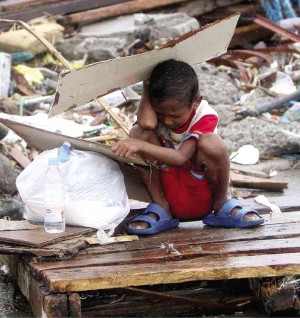Empty school chairs sign of tragedy

DISASTERS have an immeasurable effect on children who are kept from going to school, like this boy in Tacloban who shields relief for his family from the rain, when classrooms or homes are destroyed. RICHARD A. REYES
ROXAS CITY—Empty school chairs in this city’s schools meant only one thing—they belonged to children who are victims of Supertyphoon “Yolanda.”
While classes resumed on Monday, the number of absences in schools here is glaring.
At President Manuel Roxas Memorial North, a public elementary school in this city, half of 1,438 students were absent, school principal Rodrigo Alcayaga said.
Classes in other schools in the city and elsewhere in the province of Capiz, however, remained suspended because school buildings had been either destroyed or had taken in heavy damage from Yolanda.
At President Roxas East Central Elementary School in Barangay (village) Poblacion of this city, only seven of 33 classrooms are still standing. The rest lost roofs or had been damaged by fallen trees.
Article continues after this advertisementAbsences at President Manuel Roxas Memorial North has been attributed to students being victims of Yolanda themselves.
Article continues after this advertisement“Those were students whose houses in the coastal areas were devastated,” Alcayaga said, while helping some men prune tree branches and clear the schoolyard of toppled trees.
Teachers, however, did not hold regular classes yet as they were asked to conduct stress debriefing on students.
Alcayaga said some students get jumpy over loud noises. “We’re just doing playtime, dancing and singing today,” he said.
Grade 1 teacher Mary Joy Gutierez said at least three of her students came from families who lost their homes.
“Just look at Mickey’s eyes, here, you could still see he’s shocked,” she said of one of her students. Another student, a girl, came in a dirty school uniform.
Student Jahznar Buenvenida, from another Grade 1 class, said the wind blew away the roof of her house.
“We asked them how they were and most of them said their roofs were gone and they got really scared. The others, whose families could afford it, stayed in hotels,” her teacher, Lovelyn Gastar, said.
Alcayaga said schools in this city were luckier than those outside the city, which could not resume classes because their buildings had lost their roofs.
In President Roxas town, books and facilities in a public elementary school had been destroyed.
“But we ask the [students] to tell their classmates to come back to school if they could,” Alcayaga said. “A little change in their environment could be the best way you could make them forget the horror,” he said.
Classes in some schools in Capiz may not resume just yet because of damage from Yolanda.
Janet Castiller, teacher at President Roxas town’s East Central School, said classrooms in the town were old but even the newer ones did not survive Yolanda.
A room in Castiller’s school, where books were being kept, was waterlogged when heavy rain followed the storm.
“The books were supposed to be distributed to the students this week, but now they’re ruined,” Castiller said.
Yolanda killed four people and left 23,850 others in President Roxas, a fourth-class fishing town, with barely anything left.
One of the dead was driver Diosdado Magsael, 40, who was buried in rubble when the wall of an abandoned movie house collapsed at the height of Yolanda.
Magsael’s neighbor, Greg Escalona, put together used tarpaulins as a shelter for his family beside the ruins of the theater. “It’s not safe, I know, but we have nowhere else to go,” he said.
The municipal government suspended classes two days before Yolanda struck on Nov. 8. “But most of our students live in the coastal villages so I suppose a lot of them lost their homes, too,” Castiller said.